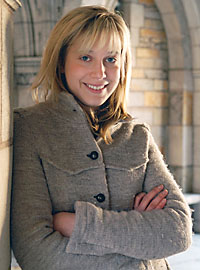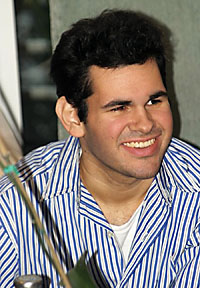 | Emily Morell |
Yale students Emily Morell and Nathan Segal were among 20 undergraduates
nationwide named to the USA Today All-USA College Academic Team for 2008. — By Dorie Baker
T H I S
USA Today honors students for
their work ‘beyond the classroom’
The honor is given annually to full-time college students for academic excellence
and for applying their intellectual abilities “beyond the classroom to
benefit society.” Members of the elite team have their photographs and
a description of their achievements published in the daily newspaper, and they
receive a trophy and $2,500 cash award.
Two seniors, Mark Beyersdorf and Nadim Mahmud, were named to the USA Today second
team; and a third senior, Robert Nelb, was selected for the third team.
Emily Morell
Morell, a junior from Oakland, California, traveled to Rwanda two summers ago
for an internship with the Clinton Foundation HIV/AIDS Initiative (CHAI) and
worked on a national assessment of pediatric HIV/AIDS care and treatment. She
was surprised to discover, she says, that the attitude among public health officials
was that HIV treatment is largely ineffective in malnourished patients and that
HIV testing in children is often futile because children die of malnutrition
before their test results are even known.
Morell discussed the problem with Emma Clippinger, a friend from Brown University
who was an intern for CHAI’s agricultural program in Rwanda. The two women
came up with the idea for a community garden program that would both feed and
provide an additional source of income for AIDS patients and their families.
Morell, who founded the international development policy center of the student-run
Roosevelt Institution, put her organizational skills to work, enlisting the support
of the Rwandan government as well as the country’s HIV/AIDS Network, which
represents more than 1,000 organized commu-nity groups of HIV-positive individuals.
Morell and Clippinger’s idea grew into the non-profit organization Gardens
for Health International (GHI) (www.gardensforhealth.org). Working in partnership
with the Rwandese Network of People Living with HIV/AIDS, GHI is now developing
community gardens throughout the country. Starting last summer with a pilot 33-acre
sustainable garden program in an area outside the capital city of Kigali, GHI
now represents 30 registered HIV/AIDS associations in the area, serving 4,131
individuals.
GHI was the winner of the 2007-2008 JP Morgan Undergraduate Good Venture Competition,
which provides the recipient organization with a $25,000 “investment.” Morell
shared the honor with fellow Yale students Julie Carney and Hae-in Lim, as well
as Clippinger.
Morell is pursuing the neurobiology track of the molecular, cellular and developmental
biology major. Since her freshman year, she has been involved in a neurosurgery
research project studying neurological changes associated with cognitive function
tasks in epilepsy patients. After graduation, she plans to attend medical school
as well as pursue global health policy.
Morell will return to Rwanda this summer to continue the work of the rapidly
expanding Gardens for Health. Her experience there, Morell says, has taught her
some important lessons in management. “I have learned to delegate, to trust
and not to micromanage,” she explains.

Nathan Segal
Nathan Segal
A Yale College senior from Gainesville, Florida, Segal has a dual major in history
of science and medicine and in ethnicity, race and migration.
At the age of eight, he volunteered to work with patients at a hospice. He was
guided to public service at that young age by a precept his Cherokee grandmother
had taught him: “Ea nigada qusdi idadadvhn,” which translates into
English as “all my relations in creation.” The saying is a call to
serve humanity, to make the world a better place and to serve as a catalyst for
change.
When he signed up at the hospice, he was told he was too young to work directly
with the patients. “All they let me do at that age was fill bird feeders,
help fill out menus and stuff envelopes to solicit donations,” he says.
But by the age of 13 he was deemed mature enough to interact with families of
the terminally ill.
One life-altering encounter he recalls was with a patient’s sister, a diabetic,
who confided to him that she was struggling to pay for a roof over her head and
food, and couldn’t afford the medication she needed to stay alive.
Segal immediately did a Google search of the companies that made all the medicines
she needed, and was surprised to find that the pharmaceutical manufacturers had
programs to help people who can’t afford the medicine they produce. However,
he claims, in addition to effectively hiding the assistance programs by not advertising
them, the drug companies make applicants fill out incredibly “convoluted” forms.
As a self-described “starry eyed 15-year-old,” Segal embarked on
a mission to enroll low-income individuals in these programs, canvassing churches
and nursing homes for people who needed assistance paying for their prescription
drugs, and then helping them to apply to the drug companies. Eventually he offered
his services through a local agency that caters to the elderly.
His efforts were so successful that he decided to defer college after high school
to continue this work.
In addition to his philanthropic work, Segal is a marine conservationist whose
passion for sea turtles led to his lecturing on the subject to student assemblies
and service organizations while he was still only in middle school. His research
on the turtles in Gainesville landed him an internship as a conservationist in
Tortuguero, Costa Rica, where thousands of tourists flock each year to see the
turtles emerge from the sea en masse to lay their eggs on the beach. Segal recalls
one occasion when, in attempting to tag one of the giant reptiles after she left
her cache of eggs in the sand, the turtle ripped through his clothing with her
flippers and bit off a chunk of his arm.
Of a diverse ethnic background, Segal most identifies with his maternal Native
American roots. Indeed, it was his Cherokee background that led him first to
Stanford University, which has a large Native population, and later — for
his junior and senior years — to Yale. “Yale has an amazing program,” he
says, noting that the University has an increasingly prominent Native American
presence on campus and an assistant dean who specifically serves their interests.
His many extracurricular activities include serving as a management fellow in
Dwight Hall, a senior class representative in the Branford College Council, treasurer
of the Association of Native Americans and of the American Indian Science and
Engineering Society, and editor of the Native American publication “Red
Ink.”
In addition to awards for his work with minority communities, Segal is the recipient
of a Udall Scholarship for his environmental contributions and a Truman Scholarship,
which provides funding for graduate school. He plans to work for awhile before
going for an advanced degree in public health or public policy. He hopes eventually
to work for health and human services or for an NGO on policy to deliver health
care to every segment of the population.
“I would love to have universal health care,” he says, “but
it would be politically challenging to go from a completely capitalistic system
to a government-run system that insures everyone.” He thinks that there
is a middle ground, and he intends to help build a more equitable system on it.
 W E E K ' S
W E E K ' S S T O R I E S
S T O R I E S![]()
 Yale study offers revolutionary view of ecosystem ecology
Yale study offers revolutionary view of ecosystem ecology![]()
![]()
 USA Today honors students for their work ‘beyond the classroom’
USA Today honors students for their work ‘beyond the classroom’![]()
![]()
 Amar and Crothers cited for teaching and scholarship
Amar and Crothers cited for teaching and scholarship![]()
![]()
 Yale expert on elections helped to monitor ‘historic’ vote in
Pakistan
Yale expert on elections helped to monitor ‘historic’ vote in
Pakistan![]()
![]()
 Yale-developed artificial cell helps immune system fight cancer
Yale-developed artificial cell helps immune system fight cancer![]()
![]()
 Divinity School professor to head Union Theological Seminary
Divinity School professor to head Union Theological Seminary![]()
![]()
 Lavik lauded for innovation, leadership
Lavik lauded for innovation, leadership![]()
![]()
 Liman Colloquium to examine public interest advocacy . . .
Liman Colloquium to examine public interest advocacy . . .![]()
![]()
 Library staff wins Noah Webster Award for . . .
Library staff wins Noah Webster Award for . . .![]()
![]()
 Campus Notes
Campus Notes![]()
Bulletin Home |
| Visiting on Campus
Visiting on Campus |
| Calendar of Events
Calendar of Events |
| In the News
In the News![]()
Bulletin Board |
| Classified Ads
Classified Ads |
| Search Archives
Search Archives |
| Deadlines
Deadlines![]()
Bulletin Staff |
| Public Affairs
Public Affairs |
| News Releases
News Releases |
| E-Mail Us
E-Mail Us |
| Yale Home
Yale Home